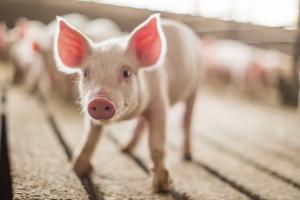The ideal pig starts with the ideal gut
By Janella Umali
Pig producers are well aware that enhanced gut health is the driving force behind profitability. Mortality, feed efficiency, growth and health costs are just a few of the many areas influenced by achieving optimal health. Positive gut health can have long-lasting effects on animal performance, herd health and producer returns.
In this webinar, Dr. Stewart Galloway, senior swine nutritionist at Hubbard Feeds, discussed the lifetime impacts of gut health strategies implemented early in the life of the pig. According to Galloway, gut health is a critical success factor that affects things such as pig value — as a source of profit and as a source of protein globally — sow productivity, animal welfare and the responsible use of antibiotics.
Gut health is essential for building a foundation for performance and profitability in pig production. Healthy pigs will eat and produce more efficiently, ensuring they are performing at their maximum potential.
What is the ideal gut?
The goal is to help generate a fully developed gastrointestinal system in which water, pH and beneficial bacteria are balanced and maintained while pathogens and toxins are kept out.
So, how you can tell if a pig’s gut is healthy? To start, observe pig activity. Are the pigs alert and moving around? Are they eating? Are they displaying normal behavior? Another indicator is diarrhea. Diarrhea is a telltale sign that something is not right with the pig’s gut, so it is important to keep an eye out for pigs that have this symptom. Other indicators of a healthy gut include lower morbidity and fewer treated pigs as well as growth and feed efficiency.
However, it is important to remember that many factors can disrupt good gut health. For example, weaning is the biggest stressor put on a pig. Poor gut health strategies implemented at this stage of life will negatively impact the pig throughout its lifecycle. Dietary changes, pathogens and mixing, and crowding stress are some of the other factors that negatively affect gut integrity.
Tips for good gut health
Galloway suggests a comprehensive program approach by implementing these three strategies for good gut health:
-
Decrease gut inflammation
-
Decrease pathogens
-
Decrease water loss
When a gut is inflamed, several problems arise: nutrients are not properly absorbed; there is an increase in antigens, leading to further inflammation; pathogens and toxins move right through the cells, causing inflammation inside the cell; and there is water loss and water movement out of the cells into the gut, leading to dehydration and diarrhea.
To combat inflammation and in turn decrease pathogens and water loss, producers should do a few critical things. First, identify the pig’s stressors and decrease stress. Second, optimize ingredient selection and combination, such as proteins and amino acids, as well as the use of carbohydrates. Third, use enzymes to draw more nutrients from the feed, making them more available for absorption by the pig for its own use and less available for the pathogens to use as a food source later on in the gut.
Achieving and maintaining a healthy gut is a continuous process and requires a complete approach to gut health, not just a one-time or quick fix. An animal truly never gets over a good or bad start. Make gut health a priority and get your pigs on track for lifelong success.
To receive a recording of the webinar and learn more about Galloway’s strategies for good gut health, click the button below:



